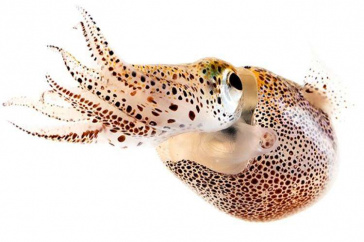UNH Researchers Receive $700,000 to Study Beneficial Bacteria in Bioluminescent Squid

Caption: Hawaiian bobtail squid (Euprymna scolopes)Credit: e.roettinger.
DURHAM, N.H. - Microbiologists at the University of New Hampshire have received a $716,000 to study the evolution of beneficial microbes by examining the relationship between the Hawaiian bobtail squid and a bacterium that helps it avoid predators by emitting light. Cheryl Whistler and Vaughn Cooper, both associate professors of microbiology and genetics, are the investigators on the three-year grant from the National Science Foundation.
"Beneficial bacteria are the foundation of health of all plants and animals, including humans, but because most research has focused on disease-causing bacteria, we don't understand these beneficial associations very well," says Whistler, who is principal investigator on the grant. "Why some closely related bacteria evolve to become trusted partners with their hosts while others evolve to cause disease remains unknown."
To better understand how these beneficial host-microbe associations evolve and function, Whistler and Cooper will turn to the tiny Hawaiian bobtail squid (Euprymna scolopes), which plays host to the light-producing bacterium Vibrio fischeri. In exchange for a home and nutrients, V. fischeri lights up the nocturnal squid's underside, fooling predators below into seeing this phony moonlight but not the dark shape of the tasty squid.
With its invisibility cloak trick, the squid-V. fischeri symbiosis is a well-studied model, giving the UNH researchers a strong scientific foundation on which to base their work. "It's a charismatic host and a glow-in-the-dark symbiont, making this system an excellent symbiosis ambassador," says Whistler.
For the grant-funded project, "The Molecular Basis of Host Adaptation and Origin of New Mutualisms," the researchers will experimentally evolve non-symbiotic V. fischeri in juvenile squid to probe the question of how this bacterium adapts to a new host and initiates the symbiosis. They will then identify the genetic basis of adaptation and study how these mutations influence their host.
"A major question in evolution is whether key innovations - such as the ability to initiate a new mutualism - arise by few mutations of large effect or by more subtle mutations," says Cooper. "We aim to learn how selection acts on bacteria with different evolutionary histories to achieve these innovations."
Whistler and Cooper anticipate that their work, by illuminating how the vast, unseen majority of bacteria living on us or in us evolve to form beneficial relationships with us, will help with strategies for improving human health.
In addition to Whistler and Cooper, both of whom are in the in the department of molecular, cellular and biomedical sciences in the College of Life Sciences and Agriculture at UNH, the grant (NSF grant number IOS-1258099 ) will fund the interdisciplinary training of two graduate and multiple undergraduate students, and will develop educational resources for middle and high school teachers.
The University of New Hampshire, founded in 1866, is a world-class public research university with the feel of a New England liberal arts college. A land, sea, and space-grant university, UNH is the state's flagship public institution, enrolling 12,200 undergraduate and 2,300 graduate students.
Photograph available to download:
/unhtoday/news/releases/2013/10/images/bobtailsquid2-4.jpg
Caption: Hawaiian bobtail squid (Euprymna scolopes)
Credit: e.roettinger, www.kahikai.com
Learn more about the symbiotic relationship between bobtail squid and V. fischeri in this National Science Foundation video: http://www.youtube.com/watch?v=x5-VcJyZRc4
-30-
Latest News
-
October 30, 2024
-
October 10, 2024
-
October 8, 2024
-
October 3, 2024
-
October 1, 2024
















































